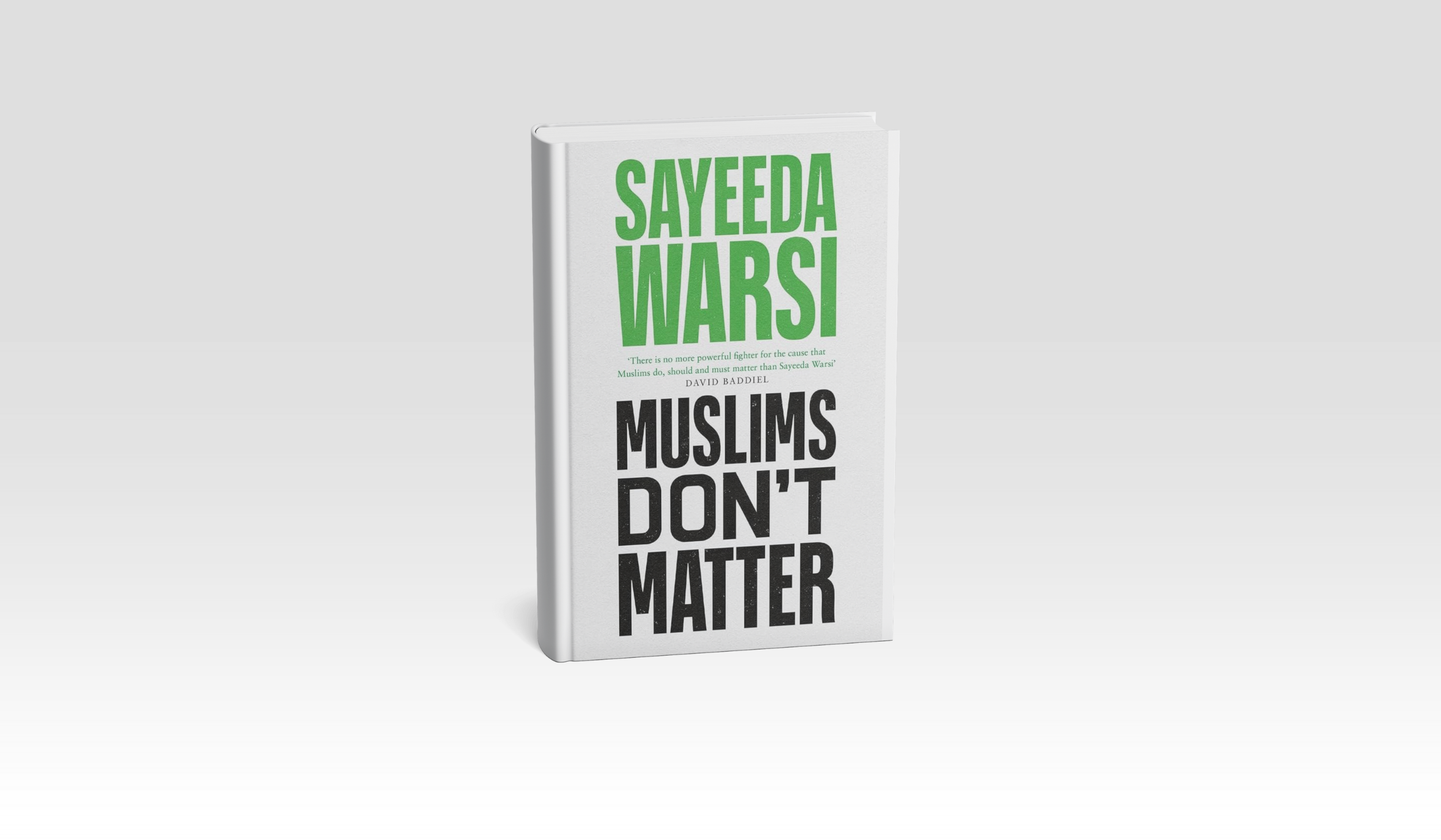Muslims Don’t Matter
Muslims Don’t Matter is the successor to Sayeeda Warsi’s earlier writings on the nation’s relationship to its Muslim populations, which she began with The Enemy Within. Both books continue the conversation about anti-Muslim racism that was popularised by her now infamous statement that Islamophobia had become so pervasive that it had passed the dinner table test. In saying this, Sayeeda Warsi brought attention to the worrying fact that it has, unfortunately,become commonplace to denigrate Muslims in both public and private spheres of life and without challenge. A fact also testified to by the absence of recognition of Islamophobia – as a form of racism that targets expressions of Muslimness – by political parties and institutions that could help in its redress.
Muslims Don’t Matter is a chilling expose of the pernicious nature of Islamophobia and what’s at stake for the nation and society if this remains unaddressed. The book is unique in presenting various manifestations of this drawn from Warsi’s own insights gained from being in governmentbut also through her countless interactions and observations from involvement in civic life too. Subsequently, Warsi is able to present a convincing yet troubling picture of the hostile environment, which not only includes well known instances of senior public figures generating political capital through maligning Muslims, but also the official policies of disengagement and misrepresentation that has left Britain’s Muslims disenfranchised in the face of far-right advances in politics and popular opinion.
A particularly laudable feature of the book is Warsi’s elaborate descriptions and accounts of how Islamophobia operates at various levels, made possible by her unique insights into government and politics from her time as a cabinet member in previous Conservative governments. In this, the book is a vital tool with which to think the dilemmaabout what hinders state recognition for legislating against racism experienced by Muslims. It makes the case for this through discussing instances where Muslims are exceptionalised. For example, when it comes to citizenship protection witnessed mostly recently in the stripping of British citizenship from Shamima Begum, protection against violence experienced during the recent summer race riots, or state interference through surveillance associated with the Prevent programme. All are chilling reminders of the age we live in, when the figure of the Muslim has become the site where old and new forms of racism currently intersect.
The seven chapters that make up the book work through various dilemmas facing British Muslims as well as the nation at large. These include the good Muslim/bad Muslim dichotomy that has been a refrain for anti-racists who have long recognised that being a racist brown person can be career enhancing when required to ‘smack down’ on brown people. And the dangers posed to a rules based order when it is possible to ignore commitments to human rights simply because they are being claimed by Muslims. Warsi points out that these are matters of equity and fairness that should bother us all. The book works its way through the numerous commissions and reviews that have addressed the issue of discrimination facing Muslims. It draws connections between equity and engagement and the concomitant effects on social cohesion. For example, important government commissionedreviews on young Muslims and social mobility and on Muslim women in the labour market. These are valuable resources for community groups in their lobbying and advocacy work. Particularly at a time when much of the spotlight is on Muslims as a threat. This is also an ambitious feature of the book; to help usurp the perception of Muslims as a threat, and instead place a focus on the importance of inclusion and making Muslims matter.
There are lessons for the whole of society in this; for anti-race organisations, Muslim communities as well as the third sector more broadly too. In doing so, Warsi proposes awhole society approach to tackling Islamophobia. In many ways the book points to actions that have been the premise of anti-race work for decades. Such as calling out bad practice and proposing ways of promoting equity through pressuring organisations to commit to actions to promote diversity and inclusion.
Muslims Don’t Matter intervenes in an area of anti-race work that has been somewhat of a riddle over the past few decades. Namely how to incorporate religion within discussions of identity, community and difference, when traditionally the markers that have been most prevalent in discussions about diversity and inclusion have been static notions of race and ethnicity. In this regard, the book can be read as making the case for religion to be thought of as an intersectional force or axis, rather than an essentialist identity position.
Importantly, the book steers clear of seeking special treatment for Muslims. In this regard, perhaps Warsi is cognisant of the claim, unjustly advanced by politicians and think-tanks from across the political spectrum that Muslims have been responsible for the ‘death of multiculturalism’. Yet, the way the book weaves the story of how and why Muslims do matter in so many spheres of British life and society, can be a useful resource to revisit debates about the future of multi-ethnic Britain championed by the Parekh Report in 2000, for example. This was the last instance when the nation had an honest and open discussion about what it means to be Britain and a nation. This book reminds us that a new conversation is desperately overdue.
Overall, the book is a valuable resource to broach public conversations about the importance of respecting and recognising difference, at a moment when debate is polarised in the service of culture wars. The book, although only available in hardback currently, makes a good companion for journeys or commutes where one encounters people of all faiths and none as part of the rhythm of daily life.

